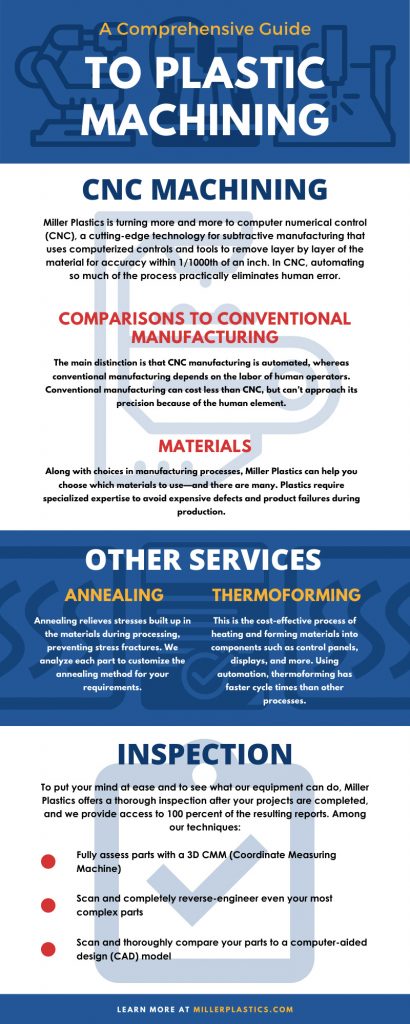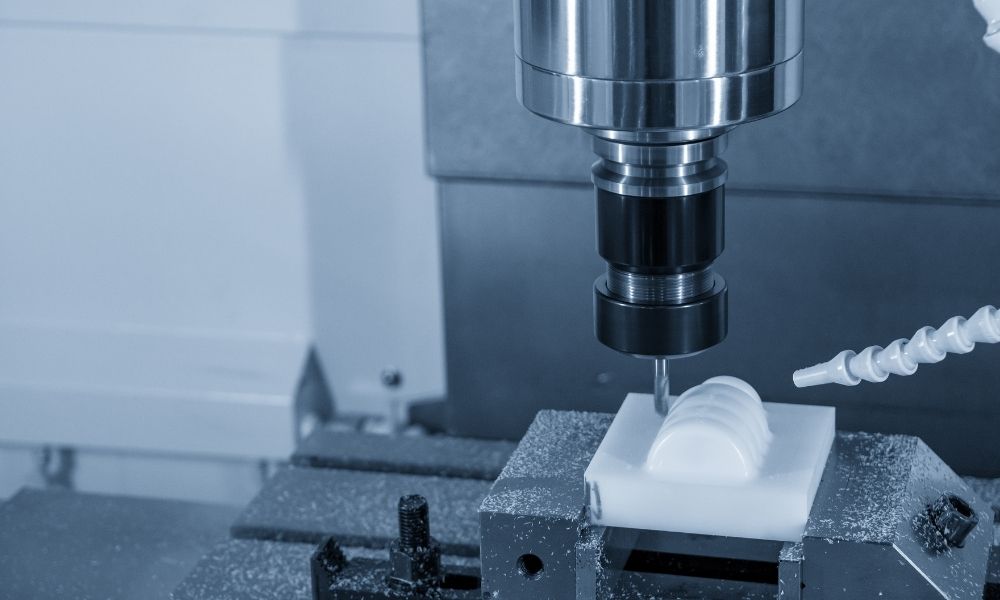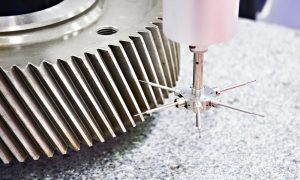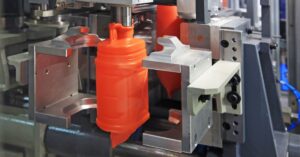There are many ways to craft plastic parts, and new technology is making it faster and less expensive to manufacture even the most complex types of parts. For you, that means more options. Miller Plastics typically relies on “computer numerical control,” or CNC machining, for its unparalleled precision and numerous other advantages. For the big picture, here’s a comprehensive guide to plastic machining as it stands today.
“Machining” means any process that starts with a piece of raw material, using a controlled technique to remove the excess material as it is cut into an ideal shape and size. These various processes are known as “subtractive manufacturing,” and all they need to make custom parts is a sample, print, or sketch. To know which combination of machining and materials are right for your project, you need to select a knowledgeable, reputable plastic products company that can help you find the quickest, least expensive manufacturing method.
CNC Machining
Miller Plastics is turning more and more to computer numerical control (CNC), a cutting-edge technology for subtractive manufacturing that uses computerized controls and tools to remove layer by layer of the material for accuracy within 1/1000th of an inch. In CNC, automating so much of the process practically eliminates human error. The most complex shape profiles are programmed into a computer, and multiple interchangeable cutters tackle the machining.
CNC machining requires the best equipment, and we pride ourselves on tools that have a five-axis capability that gives the cutting tool more approaches. This means complex manufacturing for our customers that requires less time and money. Our CNC lathes are equipped with milling heads, live tooling, and sub-spindles that can turn a large variety of parts, from custom micro-machining to turning 32-inch diameter stock. Our CNC milling capabilities range from micro-milling to 6-foot x10-foot mill tables.
Comparisons To Conventional Manufacturing
Miller Plastics also offers conventional, or traditional, manufacturing. Like CNC, it is a form of subtractive manufacturing, but the two methods have many differences. The main distinction is that CNC manufacturing is automated, whereas conventional manufacturing depends on the labor of human operators. Conventional manufacturing can cost less than CNC, but can’t approach its precision because of the human element. More specific differences include:
- CNC’s computerization requires just one skilled person at a console to operate several machines. Manual lathing requires specialized technicians for every machine, or a whole team for a project. A CNC operator programs custom software to cut parts, while a conventional operator sets up the machine and gears by hand and then manually puts it to use. In CNC manufacturing, there are no gears.
- CNC can manufacture a product using three tools while requiring less time. Conventional machines require five tools and a longer process.
- CNC is able to use more materials than traditional manufacturing.
- Because it depends largely on skilled manual labor, conventional machining is usually used for low-volume, small-quantity projects. CNC is most often used for high-quantity projects that rely on precision for complex designs.
Both machining techniques start with a raw chunk of material, subtracting the excess material until it turns your concept into reality. We provide the option of conventional or CNC technology for most machining jobs.
Materials
Along with choices in manufacturing processes, Miller Plastics can help you choose which materials to use—and there are many. Plastics require specialized expertise to avoid expensive defects and product failures during production. For instance, the right level of rigidity is important, because the wrong material could deform as the cutter tries to cut the component. There’s a broad selection of plastics and plastic composites, each with its own properties and best-use cases that can be verified through targeted testing. Here is a list of some of the materials we work with:
- Acetal Plastic
- Acrylic
- CPVC
- Ertalyte
- Kynar
- Noryl
- Nylon
- PEEK
- Polycarbonate
- Polyethylene
- Polypropylene
- PVC
- Rulon
- PTFE
- Tefzel
- UHMW
- Ultem
- Vespel
Other Services
Our annealing and custom thermoforming services are also available to you in our high-tech programmable ovens.
- Annealing: Miller Plastics is a proponent of annealing products and components because it ensures dimensional stability and strong, stress-free parts that last longer—another way for you to save both time and money. Annealing relieves stresses built up in the materials during processing, preventing stress fractures. We analyze each part to customize the annealing method for your requirements. This eliminates crazing, improves rigidity, increases chemical resistance, and makes any part more suitable for higher temperature environments with minimal deflection.
- Thermoforming: This is the cost-effective process of heating and forming materials into components such as control panels, displays, and more. Using automation, thermoforming has faster cycle times than other processes. The plastic sheet is first heated to soften it, then indexed to the forming station mold tools. A combination of air pressure and vacuum forms the main components.
- We also offer engineering, drafting, welding, plastic polishing, molded part alterations, and more—the complete spectrum for your custom plastic fabrication needs.
Inspection
To put your mind at ease and to see what our equipment can do, Miller Plastics offers a thorough inspection after your projects are completed, and we provide access to 100 percent of the resulting reports. Among our techniques:
- Fully assess parts with a 3D CMM (Coordinate Measuring Machine)
- Scan and completely reverse-engineer even your most complex parts
- Scan and thoroughly compare your parts to a computer-aided design (CAD) model
Miller Plastic Products Inc. started in the garage of Donald Miller Sr., who eventually built the company into a multi-million-dollar corporation. In 1988, his son Donnie Miller joined the business and revolutionized its operations by introducing automation. Five decades of experience from the basics to the latest technology have given them deep, experience-based knowledge of what combination of materials and processes will optimize your project.
Whether you’re seeking a one-off prototype or a high-volume production run, we’ll help you realize your vision with cost-effective, superior quality. We hope that we’ve put together a comprehensive guide to plastic machining that will be an informative start for your project. For a close-up look at our equipment, let us know if you’d like to visit Miller Plastics’ state-of-the-art facilities in Burgettstown, Penn. in the Pittsburgh area. You can contact us for a quote, too. We look forward to working with you!





Excellent weblog right here! Additionally your web site loads up fast! Miquela Brett Trisa
Really appreciate you sharing this blog. Much obliged. Arleen Chrissie Erminia Marianne Giovanni Maureen
Way cool! Some extremely valid points! I appreciate you penning this write-up plus the rest of the site is also very good. Gracia Nickey Lukash Mathilda Sloane Wheaton
I blog often and I seriously thank you for your content. The article has truly peaked my interest. I am going to take a note of your blog and keep checking for new details about once per week. I subscribed to your RSS feed too.| Amie Micheal Moira